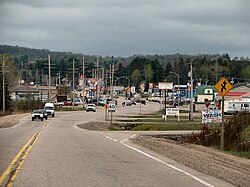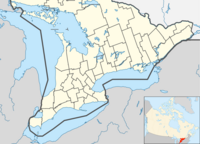Sundridge, Ontario
| Sundridge | |
|---|---|
| Village (single-tier) | |
| Village of Sundridge | |

Highway 124 through Sundridge close to Highway 11.
|
|
| Nickname(s): Sunny Sundridge | |
| Coordinates: 45°46′N 79°24′W / 45.767°N 79.400°WCoordinates: 45°46′N 79°24′W / 45.767°N 79.400°W | |
| Country |
|
| Province |
|
| District | Parry Sound |
| Settled | 1870s |
| Incorporated | March 23, 1889 |
| Government | |
| • Type | Village |
| • Mayor | Lyle Hall |
| • Federal riding | Parry Sound—Muskoka |
| • Prov. riding | Parry Sound—Muskoka |
| Area | |
| • Land | 2.30 km2 (0.89 sq mi) |
| Population (2016) | |
| • Total | 961 |
| • Density | 417.6/km2 (1,082/sq mi) |
| Time zone | EST (UTC-5) |
| • Summer (DST) | EDT (UTC-4) |
| Postal Code | P0A |
| Area code(s) | 705 |
| Website | www.sundridge.ca |
Sundridge is a village in central Ontario, Canada, approximately 75 km south of North Bay, Ontario along Highway 11, on the shore of Lake Bernard. Sundridge is a tourist destination in both winter and summer, with boating and snowmobiling providing the main attraction. Algonquin Provincial Park is accessible nearby. Cities within a reasonable driving distance include Toronto (approximately 300 km south) and Ottawa (approximately 500 km east.) The village has long been known as "The Pearl of the North" to residents of central and northern Ontario. The village is located in the Almaguin Highlands region of Parry Sound District.
Originally it was supposed to be named Sunny Ridge, but when the name was applied for in the late 1800s, an error at the post office department resulted in the name becoming Sundridge.
Sundridge developed largely as a result of the extension of the Canadian National Railway (CNR) northward. The first settler in the area – usually considered the village's founder – was James Dunbar in 1876. The CNR route in the area was completed in 1885, and the Village of Sundridge was incorporated in 1889. Protestant churches (Anglican, Methodist and Presbyterian) were established in the mid-1880s, and in 1897 the first municipal library was established. During World War I, Sundridge was the location for basic training for the 162nd Canadian Battalion.
Sundridge is located in the Parry Sound District census division. According to the Canada 2001 Census, the village has a population of 983, which represented a decline of 3.5% from 1019 in 1996. Combined with the neighbouring Townships of Strong and Joly, the population of the area in 2001 was 2642. The Village is approximately 85% Protestant, and is 96% Canadian-born, with no self-identified visible minority groups among its population. It has an area of 2.23 square kilometres.
...
Wikipedia

